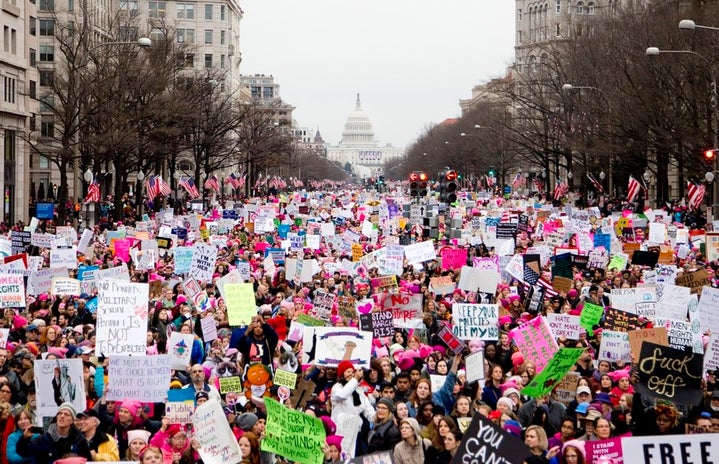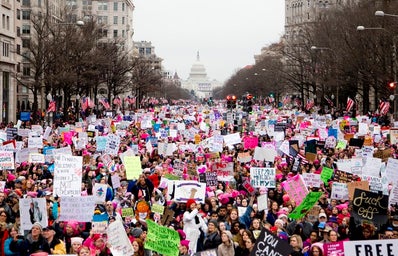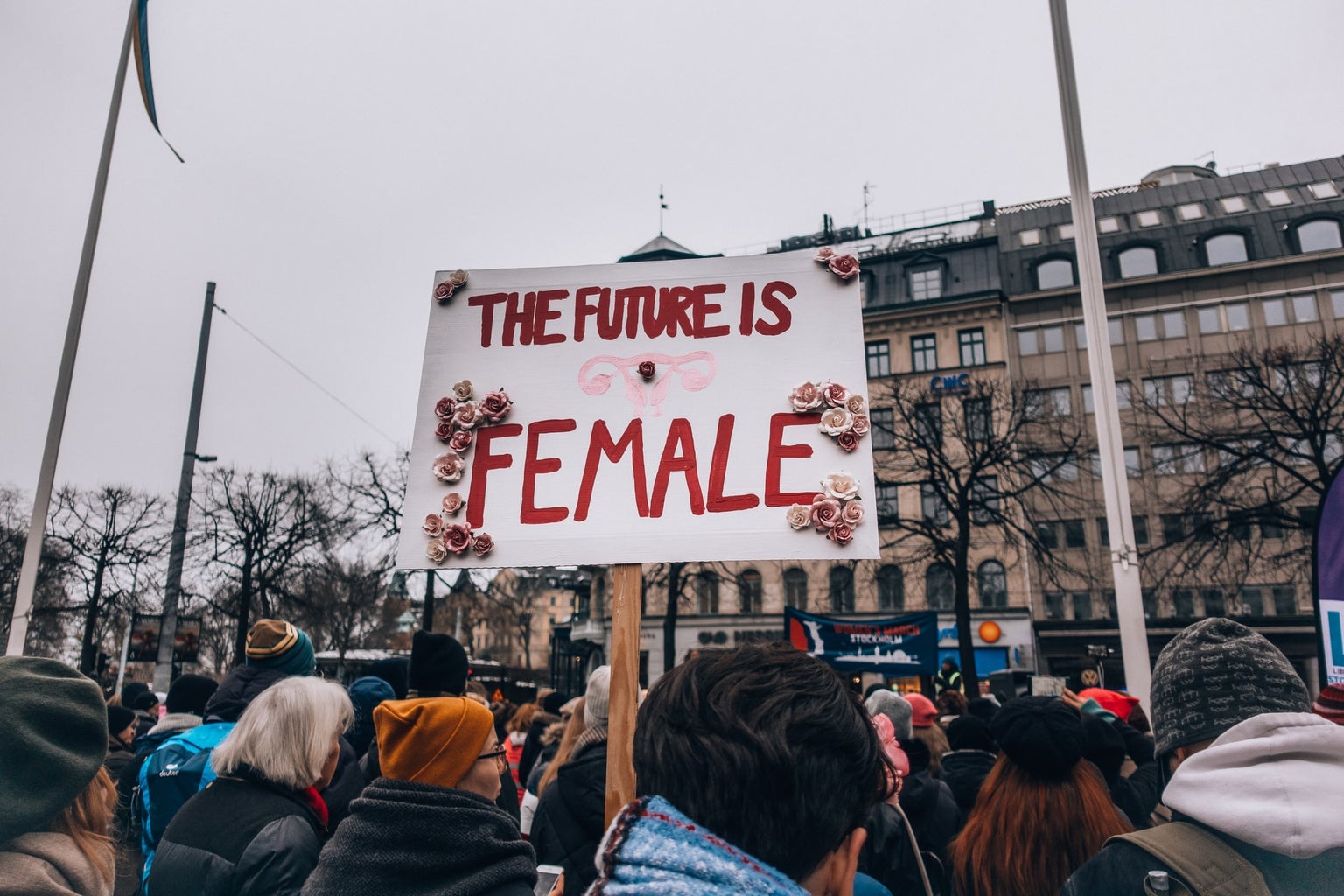When I was a high school student, feminism wasn’t presented to me in the best light. I remember that despite my values aligning with the core tenets of feminism, I was scared to classify myself as a feminist because I had teachers who actively vilified the word. My first-year history teacher actually wrote “feminism” on her whiteboard of “forbidden words” after proudly declaring that she was not a feminist. I spent most of high school confused about what feminism even meant, falling prey to the misinformation and slander that swirls around the term.
I’ve since grown out of this phase and over the past few years, have received more quality education about what it means to be a feminist. Living in a college bubble, in a relatively liberal area of the country, I am now shielded from the ill-informed comments that I would hear all of the time in high school. However, every once in a while, somebody’s comments will remind me that anti-feminist sentiments, far from having magically disappeared, continue to have a chokehold on a huge percentage of the U.S. population.
I am from Pennsylvania, a town that is right on the cusp of more rural, conservative territory. For better or for worse, there is a very diverse mix of opinions at home that isn’t as common in Santa Barbara. A few months ago, I was back home and working the restaurant job that I always do over summer and winter breaks. I was talking to a coworker, who mentioned his stepdaughter and then said disparagingly “I mean she is a feminist, but I still love her.”
In my experience, such an overt condemnation of feminism isn’t super frequent. That being said, I can sense that a good number of people have internalized this way of thinking even if they don’t explicitly say it. Oftentimes, when I relate a conversation to feminist issues and gender inequality, I can detect a suppressed eye roll, an exasperated “here she goes.” Arguably, this immediate dismissal of feminist ideas and, more largely, female voices is just as harmful as remarks that openly ridicule the movement.
So what are these misconceptions about feminism that I keep alluding to? Why are so many reluctant to embrace feminism?
For one, feminism is widely regarded as unnecessary. Given how much time has passed since the beginning of the feminist movement in the late nineteenth century and how much has been gained since then, it is confusing for many that feminists have more demands. It is tempting to use certain advancements (i.e. suffrage, the integration of women into the workplace, access to birth control, etc.) as evidence that the feminist movement has accomplished its goal.
In actuality, systemic oppression cannot be undone by the achievements of the previous two “waves” of the feminist movement alone. There is still a ton of work to be done. Yet, plenty of valid points made by feminists are dismissed because feminism is considered to be obsolete.
Feminism is also undermined by harmful stereotypes about feminists more generally. Feminists are constantly painted as radical extremists who hate men, don’t want to shave, and are just here to wreak havoc by burning bras. Women are hesitant to associate with this label and might even come to believe that feminism is only for aggressive, ugly misandrists. Male feminists have a bad reputation too, as meek, feminized “snowflakes.” All of this name-calling isolates many from the movement.
The constant squabbling over what it means to be a feminist takes away from the crux of the movement as well. Feminism strives for equality and to dismantle the patriarchy, end goals that would benefit all people who feel constrained by gendered expectations. Of course, there are valid criticisms of the feminist movement. Historically, feminism has been incredibly exclusive, concentrating solely on upper-class, heterosexual, cisgender, white women. This brand of feminism has generally been abolished, but remnants of it prevail and modern-day feminists must actively prioritize centering the voices of those women who have, for centuries, been sidelined.
However, defining feminism as a radical crusade spearheaded by bitter man-haters is not a valid critique. . . It’s just an interpretation that distorts and trivializes the feminist movement.
These misconceptions are caused by a disconnect about what feminism actually is. Seemingly, many are anti-feminist not because they disagree with the principles of the movement, but because they are repelled by a misrepresentation of it, one that encourages resentment towards men and bizarre tactics, amongst other things. Hopefully, widely clarifying what feminism is will slowly change this trend and gradually lead to a larger acceptance of the movement. A strong understanding of feminism is key to crafting a boldly feminist generation, one that cannot be easily misled by anti-feminist rhetoric and media.
How do we do this? My answer is education. And I believe that starting this education early would be game-changing. Basic concepts can be easily integrated into elementary and middle school curriculums and would correspond perfectly with the other social and emotional skills being learned by young students.
I also urge high schools to embrace a form of education that mimics the movement itself: dynamic and multifaceted. Instead of dwelling on stale facts, fixating on dates and names, relaying the history in a boring and formulaic manner, let’s teach about modern feminist issues (ones that students can likely relate to), prioritize newer feminist texts and theory, and look at how social media has shaped the movement.
Communicating the content with passion, connecting feminism to students’ lives, expressing excitement about the potential of the movement. . . I know that myself and other students around me would have been much more receptive if this was how feminism was taught at my highschool.
Obviously, implementing these changes is much easier said than done. It is not an impossible battle, though. With enough willpower, influencing local politics is very doable — a conversation with your local school board can go a long way. And supporting national organizations, ones that have the manpower and resources to put pressure on the federal and state governments to make larger changes, is another approach.
It is exciting to think about all of the possibilities, all of the changes that we have the ability to enact. Over the years, the willpower of feminists has truly changed the world, making it a more fair and inclusive place. As college students, it is our turn to take up the torch. I hope that collectively we can work together to create a society that cherishes feminism rather than degrades it.




